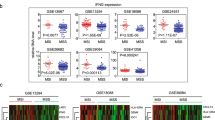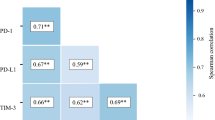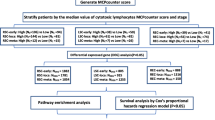Abstract
Background
A simultaneous gene expression pattern of immune checkpoint molecules might exist in colorectal cancer. This hypothesis has rarely been tested in human in vivo samples.
Objective
We investigated the gene expression patterns of immune checkpoint molecules in human colorectal cancer tissues using quantitative polymerase chain reaction (qPCR) with a focus on concurrent gene expression.
Results
We included 14 females and 16 males with a mean age was 68.5 years. The mean number of all immune checkpoint molecules did not differ significantly between normal and tumor tissues. Histological grade 3 tumors were more common in the PDCD1-expressing group [3 (25.0%) vs. 0 (0%) (p = 0.042)]. All six and four immune checkpoint molecules were expressed in eight and three PDCD1-positive patients, respectively. Specifically, CD274 was expressed in 11 of 12 PDCD1-positive patients, while LAG3 and IDO1 were expressed simultaneously in all patients expressing CD274.
Conclusion
Colorectal cancers more commonly express multiple immune checkpoint molecules simultaneously than single molecules. This suggests that blocking multiple immune checkpoint pathways may serve as a potential strategy for immunotherapy.




Similar content being viewed by others
References
Ahern E et al (2018) RANKL blockade improves efficacy of PD1-PD-L1 blockade or dual PD1-PD-L1 and CTLA4 blockade in mouse models of cancer. Oncoimmunology 7:e1431088. https://doi.org/10.1080/2162402X.2018.1431088
Anderson AC, Joller N, Kuchroo VK (2016) Lag-3, Tim-3, and TIGIT: co-inhibitory receptors with specialized functions in immune regulation. Immunity 44:989–1004. https://doi.org/10.1016/j.immuni.2016.05.001
Andre T et al (2020) Pembrolizumab in microsatellite-instability-high advanced colorectal cancer. N Engl J Med 383:2207–2218. https://doi.org/10.1056/NEJMoa2017699
Datar I et al (2019) Expression analysis and significance of PD-1, LAG-3, and TIM-3 in human non–small cell lung cancer using spatially resolved and multiparametric single-cell analysis. Clin Cancer Res 25:4663–4673. https://doi.org/10.1158/1078-0432.CCR-18-4142
Droeser RA et al (2013) Clinical impact of programmed cell death ligand 1 expression in colorectal cancer. Eur J Cancer 49:2233–2242. https://doi.org/10.1016/j.ejca.2013.02.015
He Y et al (2016) Lymphocyte-activation gene-3, an important immune checkpoint in cancer. Cancer Sci 107:1193–1197. https://doi.org/10.1111/cas.12986
Hellmann MD et al (2017) Nivolumab plus ipilimumab as first-line treatment for advanced non-small-cell lung cancer (CheckMate 012): results of an open-label, phase 1, multicohort study. Lancet Oncol 18:31–41. https://doi.org/10.1016/S1470-2045(16)30624-6
Ho HL et al (2019) PD-L1 is a double-edged sword in colorectal cancer: the prognostic value of PD-L1 depends on the cell type expressing PD-L1. J Cancer Res Clin Oncol 145:1785–1794. https://doi.org/10.1007/s00432-019-02942-y
Jeong DH et al (2015) Validation of a quantitative 12-multigene expression assay (oncotype DX((R)) colon cancer assay) in Korean patients with stage II colon cancer: implication of ethnic differences contributing to differences in gene expression. Onco Targets Ther 8:3817–3825. https://doi.org/10.2147/OTT.S95543
Le DT et al (2015) PD-1 blockade in tumors with mismatch-repair deficiency. N Engl J Med 372:2509–2520. https://doi.org/10.1056/NEJMoa1500596
Lee LH et al (2016) Patterns and prognostic relevance of PD-1 and PD-L1 expression in colorectal carcinoma. Mod Pathol 29:1433–1442. https://doi.org/10.1038/modpathol.2016.139
Lee KS et al (2017) Prognostic implication of CD274 (PD-L1) protein expression in tumor-infiltrating immune cells for microsatellite unstable and stable colorectal cancer. Cancer Immunol Immunother 66:927–939. https://doi.org/10.1007/s00262-017-1999-6
Lee SJ et al (2018) CD274, LAG3, and IDO1 expressions in tumor-infiltrating immune cells as prognostic biomarker for patients with MSI-high colon cancer. J Cancer Res Clin Oncol 144:1005–1014. https://doi.org/10.1007/s00432-018-2620-x
Morse MA et al (2019) Safety of nivolumab plus low-dose ipilimumab in previously treated microsatellite instability-high/mismatch repair-deficient metastatic colorectal cancer. Oncologist 24:1453–1461. https://doi.org/10.1634/theoncologist.2019-0129
Overman MJ et al (2017) Nivolumab in patients with metastatic DNA mismatch repair-deficient or microsatellite instability-high colorectal cancer (CheckMate 142): an open-label, multicentre, phase 2 study. Lancet Oncol 18:1182–1191. https://doi.org/10.1016/S1470-2045(17)30422-9
Paz-Ares L et al (2021) First-line nivolumab plus ipilimumab combined with two cycles of chemotherapy in patients with non-small-cell lung cancer (CheckMate 9LA): an international, randomised, open-label, phase 3 trial. Lancet Oncol 22:198–211. https://doi.org/10.1016/S1470-2045(20)30641-0
Roach C et al (2016) Development of a companion diagnostic PD-L1 immunohistochemistry assay for pembrolizumab therapy in non-small-cell lung cancer. Appl Immunohistochem Mol Morphol 24:392–397. https://doi.org/10.1097/PAI.0000000000000408
Webb JR et al (2016) PD-L1 expression is associated with tumor-infiltrating T cells and favorable prognosis in high-grade serous ovarian cancer. Gynecol Oncol 141:293–302. https://doi.org/10.1016/j.ygyno.2016.03.008
Wu W et al (2022) High expression of ring finger protein 115 contributes to the progression of colorectal cancer via WNT/β-catenin pathway. Mol Cell Toxicol 18:401–408. https://doi.org/10.1007/s13273-021-00211-z
Yu M et al (2017) Tim-3 is upregulated in human colorectal carcinoma and associated with tumor progression. Mol Med Rep 15:689–695. https://doi.org/10.3892/mmr.2016.6065
Zhou E et al (2015) Up-regulation of Tim-3 is associated with poor prognosis of patients with colon cancer. Int J Clin Exp Pathol 8:8018–8027
Acknowledgements
Not applicable
Funding
This study was supported by the Basic Science Research Program through the National Research Foundation of Korea (NRF) funded by the Ministry of Education (NRF 2017R1D1A3B03032301).
Author information
Authors and Affiliations
Contributions
Conception: HJB; YWK. Design: HJB; KMK; YWK. Supervision: JHS; SKK; CSK; MYC; BRK; KMK; YWK. Materials: HJB; JHS; SKK; CSK; MYC; BRK; SHA; KMK; YWK. Data collection and/or processing: HJB; JHS; SKK; CSK; MYC; BRK; SHA; KMK; YWK. Analysis and/or interpretation: HJB; JHS; SKK; CSK; MYC; BRK; SHA; KMK; YWK. Literature: HJB; KMK; YWK. Writing: HJB; KMK; YWK. Critical review: HJB; JHS; SKK; CSK; MYC; BRK; SHA; KMK; YWK.
Corresponding authors
Ethics declarations
Conflict of interest
Hui-Jae Bang declares that they have no conflicts of interest. Joon Hyung Sohn declares that they have no conflicts of interest. Soo-Ki Kim declares that they have no conflicts of interest. Cheol Su Kim declares that they have no conflicts of interest. Mee-Yon Cho declares that they have no conflicts of interest. Bora Kim declares that they have no conflicts of interest. Sanghyun An declares that they have no conflicts of interest. Kwangmin Kim declares that they have no conflicts of interest. Youngwan Kim declares that they have no conflicts of interest.
Ethical approval
This study was approved by the Institutional Review Board of Wonju Severance Christian Hospital (CR: 318334).
Human and animal rights
Not applicable.
Informed consent
Written informed consent was obtained from all participants.
Additional information
Publisher's Note
Springer Nature remains neutral with regard to jurisdictional claims in published maps and institutional affiliations.
Rights and permissions
Springer Nature or its licensor holds exclusive rights to this article under a publishing agreement with the author(s) or other rightsholder(s); author self-archiving of the accepted manuscript version of this article is solely governed by the terms of such publishing agreement and applicable law.
About this article
Cite this article
Bang, HJ., Sohn, J.H., Kim, SK. et al. Concurrent upregulation of immune checkpoint molecule genes in colorectal cancer. Mol. Cell. Toxicol. 19, 521–529 (2023). https://doi.org/10.1007/s13273-022-00281-7
Accepted:
Published:
Issue Date:
DOI: https://doi.org/10.1007/s13273-022-00281-7




